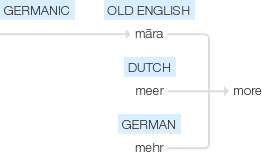More
Old English māra, of Germanic origin; related to Dutch meer and German mehr .
wiktionary
From Middle English more, from Old English māra(“more”), from Proto-Germanic *maizô(“more”), from Proto-Indo-European *mē-(“many”).
Cognate with Scots mair(“more”), Saterland Frisian moor(“more”), West Frisian mear(“more”), Dutch meer(“more”), Low German mehr(“more”), German mehr(“more”), Danish mere(“more”), Swedish mera(“more”), Norwegian Bokmål mer(“more”), Norwegian Nynorsk meir(“more”), Icelandic meiri, meira(“more”).
From Middle English more, moore(“carrot, parsnip”) from Old English more, moru(“carrot, parsnip”) from Proto-West Germanic *morhā, from Proto-Germanic *murhǭ(“carrot”), from Proto-Indo-European *mork-(“edible herb, tuber”).
Akin to Old Saxon moraha(“carrot”), Old High German morha, moraha(“root of a plant or tree”) (German Möhre(“carrot”), Morchel(“mushroom, morel”)). More at morel.
From Middle English moren, from the noun. See above.
etymonline
more (adj.)
Old English mara "greater, relatively greater, more, stronger, mightier," used as a comparative of micel "great" (see mickle), from Proto-Germanic *maiz (source also of Old Saxon mera, Old Norse meiri, Old Frisian mara, Middle Dutch mere, Old High German meriro, German mehr, Gothic maiza), from PIE *meis- (source also of Avestan mazja "greater," Old Irish mor "great," Welsh mawr "great," Greek -moros "great," Oscan mais "more"), perhaps from a root *me- "big."
Sometimes used as an adverb in Old English ("in addition"), but Old English generally used related ma "more" as adverb and noun. This became Middle English mo, but more in this sense began to predominate in later Middle English.
"Take some more tea," the March Hare said to Alice, very earnestly.
"I've had nothing yet," Alice replied in an offended tone, "so I can't take more."
"You mean you can't take less," said the Hatter: "it's very easy to take more than nothing."
As a noun, "a greater quantity, amount, or number," in Old English. More and more "larger and larger amounts" is from 12c. More or less "in a greater or lesser degree" is from early 13c.; appended to a statement to indicate nearness but not precision, from 1580s. The more the merrier "the larger the company the greater the enjoyment" is from late 14c. (þe mo þe myryer).
